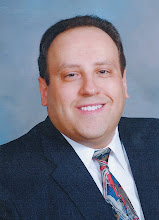Tuesday, March 16, 2010
Jackpot! Table Games Coming to 2 PA Casinos

Two Pennsylvania casinos won approval Tuesday to begin offering poker, blackjack, craps, roulette and other table games by mid-year, according to the Pennsylvania Gaming Control Board.
Downs Racing, LP, operators of Mohegan Sun at Pocono Downs in Luzerne County, and Greenwood Gaming and Entertainment Inc., operators of parx casino/Philadelphia Park Racetrack in Bucks County, were the first two licensed slots facilities in the Pennsylvania to receive approval for table games, according to a Gaming Commission press release.
Read the full release at the link below:
Gaming Control Board Grants First Authorizations to Conduct Table Games at Pennsylvania Casinos Labels: Gambling, Pennsylvania
Tuesday, March 2, 2010
Casino Revenues Up 16% in PA
Nothing gets between a gambler and a trip to the casino.
Despite two huge snowstorms that paralyzed major parts of the state, tax revenue from the play of slot machines at the Commonwealth's nine casinos was nearly 16% higher in February this year over February of 2009, according to the Pennsylvania Gaming Control Board.
The nine slot machine facilities operating in Pennsylvania during February of this year collectively generated $168,279,514 in gross revenue, compared to $145,579,665 in February of 2009 when seven casinos were in operation, the board reported. That's an increase of 15.59%.
Slot Machine Revenue in Pennsylvania Increases 16% in February Labels: Gambling, Pennsylvania
Wednesday, February 17, 2010
Pennsylvania Gaming Control Board Approves New Regulations for the Training and Play of Table Games
Tuesday, February 2, 2010
Slot Machine Revenue in PA Increases 39% in January
Wednesday, January 13, 2010
That's why they call it gambling
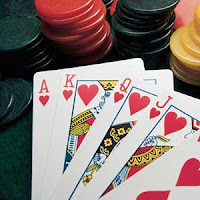
You live by gambling, you die by gambling. Remember how gambling was the magic bullet that was going to cure all of Atlantic City's (and New Jersey's) fiscal woes?
New figures show revenue at Atlantic City casinos down by more than 13 percent in 2009 as Pennsylvania slot parlors continue to eat into A.C.'s profits. Now that Pennsylvania has approved table games like poker and blackjack for its slot parlors, look for a more dramatic decline in Atlantic City casino revenues.
And as more states approve gambling, Pennsylvania will eventually see a decline as states chase the same gambling dollar.
From OnlinePoker.net:
On Monday, the New Jersey Casino Control Commission released figures showing revenue for Atlantic City's 11 casinos was down 13.2% in 2009 to $3.9 billion, the lowest levels seen since 1997.
"The numbers released today are no big surprise," commented Steve Schwartz, a Gaming Analyst. "The casino industry as a whole has been suffering through the recession in the US, and those troubles were most visible in Atlantic City and Las Vegas."
Originally, Atlantic City had only Las Vegas to compete against in the casino business, but recently has had to endure Pennsylvania slowly eating away at its profit margins, since it opened up its first slots parlor in November 2006. Last week's news that Pennsylvania was about to pass a Gambling Bill legalizing table games like poker and blackjack at its casinos, will have added further to Atlantic City's woes. Pennsylvania was forced into the move in order to help generate $250 million in revenue so as to balance its state budget, all representing a loss of potential profit for Atlantic City.
Read the
full story here.
Labels: Gambling, Pennsylvania
Thursday, January 7, 2010
Rohrer: Doubling Down on Bad Bet

State Rep. Sam Rohrer (R-Berks), who voted Wednesday against a measure approved by the House to legalize table games such as poker and blackjack at Pennsylvania casinos, issued the following statement explaining his opposition to the Democratic-led expansion of gambling:
"Five years ago, Governor Rendell sold the people of Pennsylvania a bill of goods when he signed the slots legislation into law," Rohrer said. "At the time, Rendell and the gambling lobby falsely promised the bill would create thousands of jobs, spur an economic boom and provide property tax relief. Today, Pennsylvania's unemployment rate is higher, its economy is faltering and homeowners are still burdened with excessive property taxes. With this record of failure, the legalization of table games amounts to doubling down on a bad bet."
Gov. Ed Rendell threatened to lay off nearly 1,000 state workers if the table games bill was not approved by the General Assembly by the end of the week. Rendell falsely claimed the bill was necessary to fill a supposed $250 million hole in the state budget.
"If you could fill a $250 million hole by laying off 1,000 state workers, that would mean that each of them would have to be earning approximately $250,000," Rohrer noted. "Does the governor really have that many excessively paid staff working under him? I would note that of the 1,000 state workers the governor threatened to lay off, he only threatened one in the governor's office. By comparison, he threatened to lay off 112 people who work with the Pennsylvania State Police, 38 who serve our military veterans and 19 who work in the Department of Health."
Rohrer further argued that the $250 million in revenue the legalization of table games is expected to generate are just an estimate.
"We still have some casinos that aren't up and running five years after that bill was signed into law," Rohrer said. "Somehow, the governor blindly thinks these table games are going to be set up and raking in the money in the next five months before the fiscal year ends in June. That naive belief represents a detachment from reality."
Rohrer pointed out the faulty logic used by gambling proponents, who suggest the legalization of table games would generate new jobs.
"If a Pennsylvanian spends $20 at a blackjack table, he or she can't spend that money at the local diner," Rohrer said. "Sure, it might create a job in one area of the economy, but it will do so at the expense of a worker in another area. The blackjack dealer benefits at the expense of the waitress. Taking water from one end of a bathtub and dropping it in the other won't raise the overall water level. This law will merely benefit the well-connected gambling industry at the expense of other Pennsylvania workers."
Rohrer also chastised those who propagated the false belief that legalizing table game would somehow help homeowners struggling to pay their property taxes.
"Like slot machines before them, table games offer homeowners nothing but the false hope that their property tax burden will be reduced," Rohrer said. "The truth is, the governor is betting on table games to bring in more revenues to subsidize his spending habit. Make no mistake, legalized gambling has done little for homeowners, but it has been and will continue to be a boon for free-spending politicians in Harrisburg. Pennsylvanians are tired of these 'bait-and-switch' schemes where politicians promise them property tax relief but deliver something far different. The only way to truly deal with the property tax issue is by eliminating them. No tax should have the power to leave you homeless."
The bill now heads to the governor's desk for his signature.
"Whether you oppose legalized gambling based on economic or moral principles or because it fails to deliver on its overblown promises, today represents a step backward for Pennsylvania," Rohrer said. "The Commonwealth will take a further leap backward if and when the governor places his signature on this sham of a bill. Pennsylvanians deserve better than this."
Labels: Gambling, Pennsylvania Legislature, Rep. Sam Rohrer
Wednesday, January 6, 2010
Rep. Quigley Votes Against 'Pet Projects' in Gambling Expansion Bill
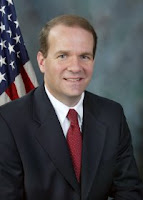
State Rep. Tom Quigley (R-146th Dist.) released the following statement regarding his 'No' vote on Senate Bill 711, which would legalize table games in Pennsylvania:
"This legislation is bad public policy for Pennsylvania. Allowing table games will only compound the many problems we have already seen from the slots parlor law and does not include the necessary reforms to ensure that Pennsylvania residents are protected from corruption. The answers to our state’s financial woes do not lie in preying upon the most vulnerable citizens, who are the most likely to suffer from a gambling addiction and who often have lower incomes.
"One aspect I found particularly troublesome were the pet projects written into the language. There are very specific earmarks being funded, which are unfair to the other worthy causes that were left out. It is another example of "pet projects" that we have seen in bills like the federal health care reform legislation. This kind of pork is contrary to good government.
"Speaking of worthy causes, this bill does not include a dime for property tax relief. The majority of the revenue from this bill will go into the General Fund, leaving taxpayers out in the cold. Homeowners are still waiting for the meaningful property tax relief they were promised when slot machines were approved, and their concerns were still not addressed in this legislation. If it were up to me, every dollar of revenue collected would go to offset school property taxes.
"Finally, this is bad public policy because it expands gaming before much-needed reforms are considered. If you have a high rise that has a faulty structural system, you don’t add more floors until you address the safety issues. Without those necessary reforms, Pennsylvania is opening itself up to more cases of corruption involving gaming, when everything could have been avoided by taking up these issues in the proper order."
The controversial table games bill passed the House Wednesday by a vote of 103-89, with mostly Democrats supporting the measure.
Labels: Gambling, Montgomery County, Pennsylvania Legislature
Friday, December 18, 2009
Sam Rohrer: Free the Hostages

State Rep. Sam Rohrer, R-Berks, a candidate for Pennsylvania governor, has sent a scathing message to supporters blasting the current governor and the Democratic leadership in the House for linking state funding to colleges with passage of expanded gambling.
Here is Rohrer's comments:
Lobbyists for Organized Gambling are at it again! This time, their ally-in-chief, Governor Ed Rendell and a majority in the state House of Representatives are holding up hundreds of millions of dollars in higher education funding to Pitt, Penn State, Lincoln and Temple in an unprecedented push to legalize high-stakes, casino table games.
This bill is truly insidious.
In addition to giving casino operators a discounted 14% tax rate (as opposed to a 55% rate for slots), they will now be able to issue lines of credit to prospective gamblers. That’s right, predatory, credit card gambling.
Friends, you know the truth about this destructive lie. When Pennsylvania approved a state lottery, it was billed as the savior for senior programs. When they approved off-track betting, small games of chance and later 67,000 slot machines were proposed and approved, they came with a promise - easy cash to fund worthy programs.
To date friends, Pennsylvania's political leaders have embraced gambling, but failed to deliver the promised windfall profit. Sounds like a Ponzi scheme to me doesn't it?
This afternoon, we're headed back to the House floor to debate this bad bill. The deck is stacked, the special interests are getting ready to celebrate, but there is still hope!
Will you please contact your state representative this afternoon? Visit the Pennsylvania Family Institute to see who needs to hear from you, and the best way to get connected.
This battle is worth the 5-minute investment of your time and energy. Will you help take on Organized Gambling?
Labels: Gambling, Pennsylvania Legislature, Rendell, Rep. Sam Rohrer
Thursday, December 17, 2009
Schroder blasts 'disgraceful' tactics by Rendell, Eachus
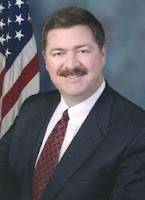
Rep. Curt Schroder, R-155th Dist., the Republican chairman of the House Gaming Oversight Committee, said in a prepared statement Thursday that Gov. Ed Rendell and House Majority Leader Todd Eachus (D-Luzerne) have destroyed any credibility they may have had with state universities and the public after insisting that legislation authorizing table games in the Commonwealth had to pass
before state universities could be funded.
"House Republicans had insisted that the money needed to fund the universities of Pittsburgh, Penn State, Temple and Lincoln was there all along and that the universities were being used as pawns in Rendell's and Eachus's determination to expand gambling in Pennsylvania," said Schroder. "Now the majority leader, who for weeks had been towing the governor's line, admits that the money is indeed there and that the governor should sign the legislation on his desk to release the funding.
"For weeks, the universities, students and their families have had to endure the possibility that substantial tuition increases would be necessary if the state's appropriation did not come through. Students have had to entertain the possibility that they might not be able to afford to return to college for the spring semester. It was a cruel and unnecessary exercise - all to satisfy the gambling ambitions of Rendell and Eachus," Schroder said.
At a Harrisburg press conference earlier in the day, Rendell said he will sign legislation that the House passed earlier this week, releasing $700 million for the universities. The House did not take up table games legislation, pushing a possible vote on the issue until early 2010.
Labels: Broken Promises, Democrats, Gambling, Pennsylvania Legislature, Rendell
Wednesday, December 9, 2009
Rep. Schroder to Legislature: Read the Bill!

From state Rep. Curt Schroder (R-155th Dist.), Republican chairman of the House Gaming Oversight Committee:
State Rep. Curt Schroder has gathered the necessary support to require a line-by-line reading of the pending table game legislation before a final vote is taken on the bill.
In a letter Monday to House Speaker Keith McCall (D-Carbon), Schroder expressed concern that lawmakers will not have sufficient time to read and consider Senate Bill 711, legislation that would authorize table games in the Commonwealth.
Schroder, having obtained the signatures of 51 House members, made a formal request to have SB 711 read aloud during session to allow lawmakers the opportunity to hear the contents of the hastily-drafted bill before a final vote can be taken to expand gambling in Pennsylvania.
"Substantial changes have been made to the table games legislation in recent weeks and House members have had almost no time to review it," said Schroder.
"Controversies such as those surrounding Foxwoods Casino in Philadelphia, the possibility of additional resort licenses and the expansion in the number of slot machines in existing casinos are also rumored to be part of the final bill. These changes deserve our thoughtful consideration. By forcing a line-by-line reading of the bill as provided under House Rule 21, Pennsylvania citizens can be assured that their representative knows what he or she is voting on."
Schroder said the original gaming legislation that authorized slots in Pennsylvania five years ago was riddled with problems that have yet to be rectified. By invoking Rule 21 and forcing a line-by-line reading of the bill on the House floor, he said lawmakers can make an informed decision.
A formal set of rules governs session conduct and procedures in the House. Rule 21 maintains that all amendments to a bill be printed and made available to House members prior to a final vote on a bill. It further states that upon written request to the presiding officer by at least 25 percent of the members elected to the House, any bill shall be read at length.
Labels: Curt Schroder, Gambling, Pennsylvania Legislature
Sunday, October 4, 2009
Vereb Proposal to Reform Pennsylvania's Gaming Industry Passes House
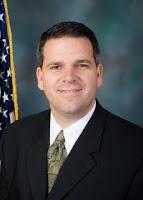
Rep. Mike Vereb, R-150th Dist., released the following statement regarding the Pennsylvania House of Representatives' unanimous passage of his proposal to reform background checks of members of the Pennsylvania Gaming Control Board:
"Tonight we had the opportunity to fix a major flaw in the original gaming law concerning the conduct of background checks. If we are going to expand Pennsylvania's gaming industry to include table games, we need to make sure that reforms are put in place so that past mistakes are not repeated. It is important for background investigations to be conducted by trained law enforcement professionals. Moving background investigations of the four highest executive positions on the board to the Pennsylvania State Police will ensure a more thorough vetting process. My legislation also puts more integrity into the process by banning any direction or communication between the investigators and the board or its employees regarding an open background investigation.
"The need for reform is by no means over; however, my legislation is a good first step. I applaud my House colleagues for taking the initial step toward gaming reform. I have been pushing for gaming reform since I first came to the House in 2007. I look forward to continuing to work with House members from both sides of the aisle in continuing to fix Pennsylvania's fractured gaming law."
Vereb's amendment, which was inserted into Senate Bill 711, mandates that background checks of potential board members, including the four highest executive positions, be conducted by the Pennsylvania State Police.
Labels: Gambling, Pennsylvania Legislature
Tuesday, September 22, 2009
Internet gambling tax to pay for health care?

Democrats are pulling out all the stops to push for government-run health care. A Democratic senator thinks government regulation and taxing of Internet gambling could help pay for part of the massive cost of Obamacare.
An amendment offered by Sen. Ron Wyden (D-OR) would dedicate Internet gambling tax revenue generated through implementation of the currently pending Internet Regulation, Consumer Protection and Enforcement Act (H.R. 2267) to increase low-income subsidies provided through the America's Healthy Future Act of 2009, according to a group called the Safe and Secure Internet Gambling Initiative.
I wonder if Obamacare will cover addiction to Internet gambling?
A PricewaterhouseCoopers analysis shows that collecting taxes on regulated Internet gambling would allow the U.S. to capture up to $62.7 billion over the next decade, says the Safe and Secure Internet Gambling Initiative.
"We applaud Senator Wyden's proposal to collect and put to good use tens of billions in Internet gambling revenue that would otherwise be lost in the underground marketplace," said Michael Waxman, spokesperson for the Safe and Secure Internet Gambling Initiative. "The Senate Finance Committee should approve the resolution, finally putting to an end a failed prohibition on Internet gambling that leaves Americans unprotected and unlicensed offshore operators as the only beneficiary in a thriving marketplace."
The Internet Gambling Regulation, Consumer Protection and Enforcement Act of 2009 (H.R. 2267), introduced in May by House Committee on Financial Services Chairman Barney Frank (D-MA), would establish a framework to permit licensed gambling operators to accept wagers from individuals in the U.S., says the Safe and Secure Internet Gambling Initiative.
Is this the same Barney Frank who presided over the financial collapse of the past year? And just one more question: If Obamcare will cost at least $1 trillion, how is $62 billion going to cover the cost? I'm sure Barack Obama and Barney Frank have it all figured out.
Senator Proposes Use of Internet Gambling Revenue to Help Fund Health Care ReformLabels: Congress, Democrats, Gambling, Health Care
Thursday, September 3, 2009
New Pennsylvania Casinos Spur 20 Percent Revenue Increase in August
Friday, July 31, 2009
PA Lottery Ticket Sales Exceeded $3.08 Billion

Times are tough but Pennsylvania residents are still finding a few bucks to buy lottery tickets. OK, it's more than a few bucks.
Pennsylvania just recorded its second best year for ticket sales in the Pennsylvania Lottery's 37-year history, Secretary of Revenue Stephen H. Stetler announced Friday.
Fiscal year 2008-09 Lottery sales totaled $3.088 billion, which was $1.1 million, or 0.04 percent, less than the previous year, according to Stetler.
"Despite tough economic times, the Pennsylvania Lottery had an extraordinary year and only narrowly missed exceeding last year's sales record," Stetler said in a press release. "Throughout the year, ticket sales were in line with last year and, in some months, slightly ahead. Instant games appear to be the games of choice for many players, as sales in that category set a new record."
Stetler won't go this far, but I give the credit to Gus, the second most famous groundhog in Pennsylvania. Every time I see Gus on a TV commercial, I have to run out to buy lottery tickets.
Read the full press release at the link below:
Pennsylvania Lottery Achieves Near-Record Annual Sales; Record Instant Game SalesLabels: Gambling, Pennsylvania, Senior Citizens
Thursday, July 9, 2009
A casino in Berks County?
Monday, May 11, 2009
Report: Rendell forgot to disclose $2,000 in slots winnings
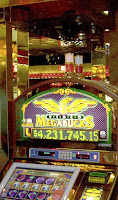
Gov. Ed Rendell, who signed the 2004 bill legalizing gambling in Pennsylvania, hit the jackpot last year to the tune of $2,000 while gambling at one of the state's slot parlors.
The news is being reported more than a year later because Rendell neglected to report the winnings on his 2008 Statement of Financial Interest, a form elected officials are required to fill out every year.
The governor's spokesman called it a "clerical oversight." You don't say. I'd like to believe him but this is Ed Rendell we're talking about.
From a story in The Philadelphia Inquirer:
Rendell reported his winnings on his 1040 tax form, which he filed jointly with his wife, a federal appellate judge, to the IRS last month. (The couple reported $446,682 in adjusted gross income in 2008, primarily from their government salaries.)
Tax returns are not public documents, though Rendell has provided them when reporters have asked.
If he had not released his return this year, the public might never have known about his winnings. That's because Rendell did not disclose them on his 2008 Statement of Financial Interest, a public document filed with the state Ethics Commission last week.
The commission considers gambling winnings income, and public officials must report them on their financial interest forms if they exceed $1,300 annually.
Chuck Ardo, Rendell's press secretary, said aides who help the governor fill out such disclosures simply had failed to note the winnings on his seven-page ethics report. Ardo called it a "clerical oversight."
Read the full story at the
newspaper's Web site.
Labels: Gambling, Pennsylvania, Rendell
Monday, April 27, 2009
Reforming gambling in PA
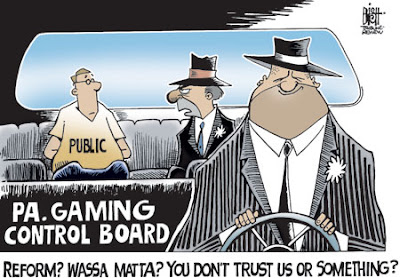
The appointment of Greg Fajt, Gov. Ed Rendell's chief of staff, to replace Mary DiGiacomo Colins as chairman of the Pennsylvania Gaming Control Board has not instilled confidence in the editorial board of The Pittsburgh Tribune-Review.
From a recent editorial:
Pennsylvanians haven't exactly hit the jackpot with the state's continually spinning, always controversial Gaming Control Board. They've received lots of lemons along the way.
Loose licensing. Board employees at odds with the law. "Transparency"? What's that? And talk of a possible FBI and/or state grand jury investigation doesn't exactly instill confidence in this enterprise.
What's needed, now, is an advocate for the public interest, not an arrogant bureaucracy that has gambled away its credibility.
Read the full editorial at the
newspaper's Web site.
Labels: Gambling, Pennsylvania, Rendell
Wednesday, April 15, 2009
Rohrer: Rendell misses point about property taxes
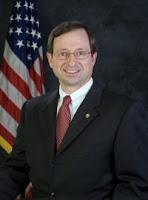
State Rep. Sam Rohrer, R-Berks, who has led the fight to eliminate property taxes in Pennsylvania, says Gov. Ed Rendell still doesn't get it.
Pennsylvanians are no closer to truly owning their homes than they were when Rendell took office in 2003, according to Rohrer.
While Rendell is touting his administration expects to deliver $200 in average property tax relief to Pennsylvania homeowners this year, Rohrer says Rendell misses the point about Pennsylvania's onerous system of property taxes to fund schools.
"At the end of the day, not one single Pennsylvanian is any closer to truly owning their home as a result of legalized gambling," Rohrer said in a statement. "The only way Pennsylvanians can truly own their homes is if the state completely eliminates the school property tax. Until that happens, homeowners are merely renting their homes in exchange for school property tax payments. After all, if a homeowner fails to pay, the government will evict them."
Rendell's budget secretary announced today that she has certified approximately $770 million in property tax relief for 2009, but Rohrer argues that that is simply proof that people continue to lose money at Pennsylvania casinos.
"In order for homeowners to win, the Pennsylvanians who put their money in slot machines must lose," Rohrer said. "The entire system is built around creating more dependence. It seems that the governor desires that homeowners, from senior citizens to working families, become dependent on this state tax 'relief' program in order to be able to pay their school property tax bill rather than fixing the problem so they can keep their home. Schools are increasingly dependent on people losing their hard-earned money as the way to fund our public schools. Compulsive gamblers are then encouraged to look to government services to help them quit the addiction government encouraged them to start. The whole thing is set up so that people look toward government for the answers to their problems when, in fact, the existing school property tax system is the real problem."
The Rendell property tax relief provided an average of $169 per household in relief in 2008, although some homeowners received as little as $50.
Rohrer said the "relief" that Rendell is promoting has already been eaten up by higher property taxes imposed by most of the state's school districts.
"For many homeowners, the $200 in so-called 'relief' they will receive is less than the amount their property tax bills were raised since 2006," Rohrer said. "Pennsylvania homeowners deserve more than the false hope the governor’s gambling scheme has to offer."
Read Rohrer's full release at the
Pennsylvania House Republican Caucus Web site.
Labels: Broken Promises, Gambling, Property Taxes, Rendell
Wednesday, March 18, 2009
Government-sponsored vice
The Pennsylvania Liquor Control Board today released a report to the General Assembly on the growing problem of underage and high-risk drinking in the state.
I never understood why Pennsylvania has a monopoly on alcohol sales in the state.
One the one hand, the state promotes alcohol consumption to increase revenues. On the other hand, the state spends money to help enforce anti-drinking laws and get help for people who have a drinking problem. Same goes for gambling (lottery, slot parlors).
Why does the government promote certain vices (gambling, drinking) but not others (drugs, prostitution)?
PLCB Issues Report on High-Risk, Underage Drinking Among Pennsylvania's YouthLabels: Gambling, Pennsylvania, Taxes
Monday, March 9, 2009
Government-sanctioned gambling only
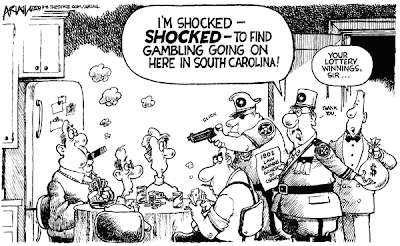
You can substituted "Pennsylvania" for "South Carolina" in this editorial cartoon by Robert Ariail, but it still doesn't make it any easier to comprehend the schizophrenic reaction of government to gambling. It's illegal ... unless the state gets its cut. The Pennsylvania Legislature is expected to consider a proposal by Gov. Ed Rendell to legalize video poker machines. Pa. officials estimate there are at least 17,000 illegal video poker machines in use right now.
Labels: Gambling, Pennsylvania, Robert Ariail Cartoon
Friday, March 6, 2009
Does Ed Rendell have a gambling problem?
Columnist Gil Spencer, writing in the Delaware County Daily Times, imagines a scenario where Gov. Ed Rendell attends the most recent Harrisburg meeting of Problem-Gamblers Anonymous.
From Spencer's column:
ED: I hardly gamble at all. I mean, I’ll bet the governor of another state the occasional cheesesteak if the Phillies or Eagles are in the playoffs, but I don’t even actually shell out for that. It’s in my office budget.
HOST: So you gamble with other people’s money, you mean, not your own.
ED: That’s just a P.R. thing.
HOST: Whatever you say, Ed. It’s your mike.
ED: Look, I’m here to let every one of you know that the state of Pennsylvania and my administration cares about your issue, ‘er addiction, umm, problem. And that’s why we’re offering $5,000 grants to groups like this one all over the state to make sure that problem gamblers, like yourselves, get the funds and information they need to help battle their addictions.
ADDICT 1: What about your addiction — the state’s addiction — to gambling revenues?
ED: I wouldn’t call it an addiction.
ADDICT 2: What would you prefer? Dependence?
ED: I would prefer “policy choice.”
A1: That’s a good one. Maybe that’s what I should call my losing my house thanks to my gambling losses — my “policy choice.”
ED: You don’t understand, the state makes money from gambling. We don’t lose. We can’t lose.
A2: Then how come the state is $2.3 billion in debt? If I owed $2.3 billion, somebody, somewhere would be calling me a loser. A big one.
Read the full column at the
newspaper's Web site.
Labels: Gambling, Pennsylvania, Rendell
Tuesday, March 3, 2009
'Problem Gambling Awareness Week'
Friday, February 27, 2009
'Problem Gambling Awareness Week'
Wednesday, February 18, 2009
Rendell Pushes for Expanded Gambling
Wednesday, February 4, 2009
Rendell gambles with PA's future
Gov. Ed Rendell's first term in office will be remembered for three things: 1) one of the largest income tax hikes in state history; 2) the legalization of slot machines; and 3) signing the infamous pay raise into law.
Not exactly a stellar record of accomplishment, but Rendell conned enough Pennsylvania voters to give him a second term.
What will Rendell's second term be remembered for? He still has two years to go, but Pennsylvania is facing a historic budget deficit. The state budget is expected to finish $2.3 billion in the red by June and the next fiscal year is downright apocalyptic with the state facing a $5 billion to $6 billion revenue shortfall.
What is Gov. Rendell's solution to the problem he largely created with uncontrolled spending over the past six years? It appears that he will ask the federal government for a handout and make up the rest by expanding gambling in Pennsylvania.
Rendell wants to legalize video poker machines, according to
The Pittsburgh Tribune-Review. The selling point for expanded gambling is "tuition assistance" for working families in Pennsylvania.
You'll recall Rendell sold the initial foray into slots by promising "substantial property tax relief" for all Pennsylvania taxpayers. That hasn't happened in the nearly five years since gambling was approved by the Legislature.
Pennsylvania homeowners are paying higher property taxes today than they did when Rendell took office in 2003. Whatever minor reduction in taxes homeowners saw in 2008 will be eaten up shortly by another round of tax hike by local school boards.
From the Tribune-Review:
Critics in the Legislature say providing tuition relief is a laudable goal, but legalizing video poker machines is an expansion of slot machine gambling.
"The reality of it is, they are slot machines," said Rep. Mike Vereb, R-Montgomery County. "We're being barbaric. We're going into neighborhoods with gambling when we don't have gambling under control."
If the administration's logic is that it's OK to legalize practices that take place illegally, said Republican Rep. Doug Reichley of Allentown, "The Chicken Ranch in Reno, Nev., is looking forward to the day we open prostitution in the Capitol."
Through the Local Law Enforcement Grant Program, the state recently spent more than $3 million to combat illegal slots and video poker machines.
Rendell may have fooled enough lawmakers in 2004 when he won approval to bring 71,000 slot machines to Pennsylvania, but don't bet on Fast Eddie pulling another fast one on the current Legislature.
Labels: Broken Promises, Debt, Gambling, Pennsylvania Legislature, Property Taxes, Rendell
Friday, December 26, 2008
Loopholes in PA gambling laws
When you're rushing through a middle-of-the-night vote on legislation, it's easy to forget some of the details.
The bill ushering slot parlors in Pennsylvania was another of those after-midnight votes taken in July 2004.
One of the loopholes in the law regulating casinos has to do with vendors with criminal records doing work at casinos.
It's already happened The Meadows Racetrack & Casino, as reported by the Pittsburgh Tribune-Review.
Senate Republicans, led by Senate Majority Whip Jane Orie and Sen. John Rafferty, R-Chester County, are attempting to rectify the flaw.
Read more about their efforts at the
Tribune-Review's Web site.
Labels: Gambling, Pennsylvania Legislature
Friday, November 28, 2008
PA's secretive gambling board
There was always something fishy about the way gambling came to Pennsylvania.
At the prompting of Gov. Ed Rendell, the Legislature approved casino gambling with a middle-of-the-night vote on July 4, 2004, right before taking its summer vacation.
It's been downhill ever since.
The Pittsburgh Tribune-Review notes that the Pennsylvania Gaming Control Board remains one of the most secretive in the nation.
From a Tribune-Review editorial:
The commonwealth's supposed gaming watchdog has conducted 128 private meetings ("executive sessions") but only 77 open meetings. Pennsylvanians have every right to know what is being done in their name and have every right to suspect the worst given the board's typical closed-door policy and closed-minded attitude about the public's right to know.
The newspaper also says the gaming board has had a checkered history:
The board's brief yet bumbling history includes its first chairman stepping down weeks after his appointment amid troubling questions about his background; two of its lawyers and an investigator being charged after bar fights in 2005 and 2006; and a former spokesman serving a prison sentence for involuntary manslaughter because, thanks to a drinking binge, he dropped his girlfriend from the 23rd floor of a Harrisburg high-rise.
Read the full editorial at the
newspaper's Web site.
Labels: Gambling, Pennsylvania, Rendell
Wednesday, June 11, 2008
Slots hurt lottery sales in PA
Some of us with common sense figured out way back in 2004 when Pennsylvania legalized casino gambling that the slot parlors would eventually take their toll on the state's lucrative lottery business.
Gov. Ed Rendell, who either lacks common sense or says things he knows are not true, was adamant that the lottery and casinos could co-exist without any decline in revenue.Guess who was right?
The Associated Press, reviewing a report released to the Pennsylvania Legislature Wednesday, found that that county-by-county sales of lottery tickets in 2006 and 2007 declined in counties that hosted a slots casino.
In other words, there is a finite amount of gambling money out there. People who used to buy lottery tickets to get their gambling fix are going to casinos instead. They don't have enough disposable income in Ed Rendell's Taxsylvania to do both.
From the Associated Press story:
Officials in Gov. Ed Rendell's administration told the AP in July 2006, before slots casinos opened, that they expected lottery sales to be unaffected by slot machines, although they also projected sales to slow after several years of expanding the number of ticket retailers and adding new games with better odds.
Wrong again, Ed!
Read the full story, "Slots hurting nearby lotteries," in today's edition of
The Mercury.
Labels: Gambling, Pennsylvania Legislature, Rendell
 Two Pennsylvania casinos won approval Tuesday to begin offering poker, blackjack, craps, roulette and other table games by mid-year, according to the Pennsylvania Gaming Control Board.
Two Pennsylvania casinos won approval Tuesday to begin offering poker, blackjack, craps, roulette and other table games by mid-year, according to the Pennsylvania Gaming Control Board. RSS
RSS













